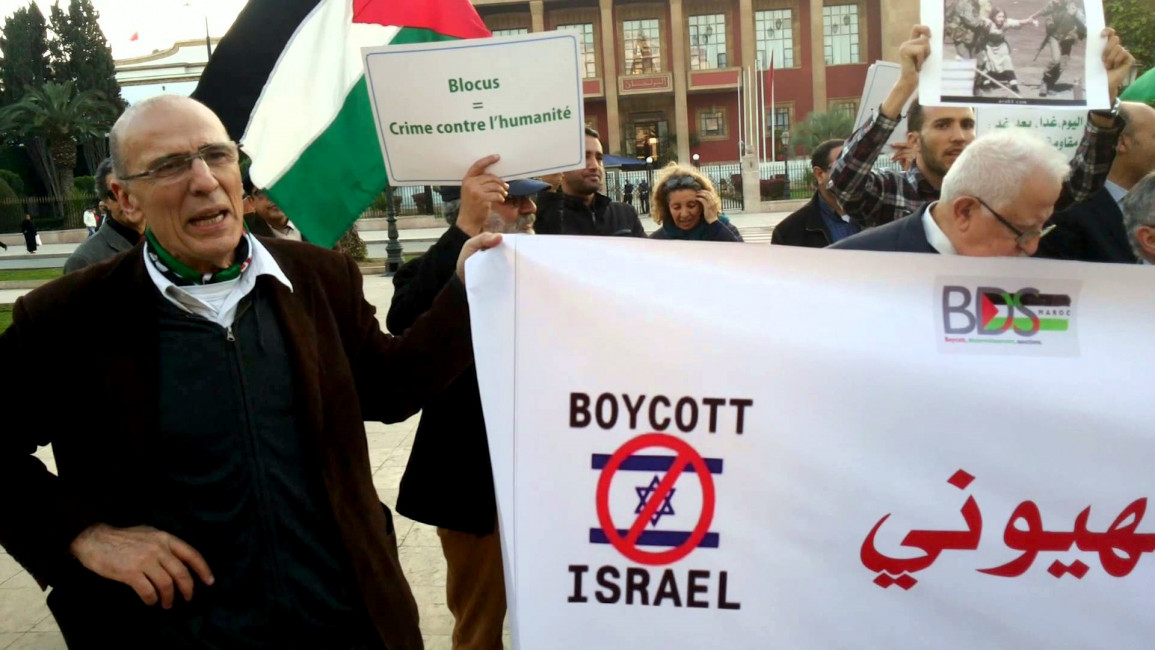
Today's BDS is not the past Arab boycott campaign
Supporters of Israel trying to counter the burgeoning boycott, divestment and sanctions (BDS) movement sometimes seek to paint BDS as a continuation of the Arab League boycott of Israel.
On the surface, these attempts might seem potentially valid. However, beyond the basic parallel, and with closer inspection, the comparison turns out to be just as misplaced and meaningless as the rhetorical smear that BDS is "economic terrorism".
The so-called "Arab boycott" officially began in 1945. Despite never technically having been called off, the capacity it had in the mid-1970s to cause genuine concern to Israel by limiting economic investment in the country has long since diminished.
Though it has lasted decades, ever since Israel’s 1979 peace treaty with Anwar Sadat’s Egypt, its impact has slowly declined. The Oslo Accords of the 1990s, which brought neither peace nor justice to Palestinians, did benefit Israel’s business elites by further weakening the Arab boycott project.
By 1996, Britain’s Foreign Minister Jeremy Hanley declared that the boycott was "withering on the vine". And he was right.
Today's BDS is something else
By contrast, the contemporary BDS movement - launched by Palestinian civil society in 2005 - is rapidly growing and making ever-increasing strides. Figures released around the ten year anniversary of the BDS call, in July this year, showed that foreign direct investment in Israel was down almost 50% in 2014 compared to the previous year.
It is important to note that Palestinians had long employed boycott tactics to resist colonialism, long before the Arab boycott was started.
| The Oslo Accords of the 1990s, which brought neither peace nor justice to Palestinians, did benefit Israel’s business elites by further weakening the Arab boycott project. |
Interestingly, the features of the BDS movement today which most convincingly explain its success are precisely those same characteristics which distinguish it from the Arab League boycott. There are at least four major differences.
The first significant one is that BDS consciously invests trust in ordinary people through grassroots initiatives. While the Arab boycott was state-led and enforced by governments, BDS is a popular citizen-led social movement.
The Palestinian call for BDS explicitly appealed to "people of conscience all over the world" because governments and international institutions have for so long failed to hold Israel accountable for its crimes.
Ultimately, government sanctions on Israel are an aim and a necessity. But, as was the case with apartheid in South Africa, it is likely that the most powerful nation-states will only be induced to impose sanctions on Israel under immense pressure from a grassroots international solidarity movement.
The second important difference is related to the first. Because BDS is a bottom-up movement, it has to engage more in ideological struggle. It has risen to the challenge of articulating a clear ethical and political case for BDS, framing it in terms of human rights and international law as well as anti-colonialism. It has incorporated academic and cultural as well as consumer boycotts.
In contrast, the top-down boycott which Arab League states imposed, using blacklists (which BDS eschews), was far more focused on economic measures and relied more on coercion. Though the Palestine Liberation Organisation (PLO) and others tried, they struggled to get the case for the boycott heard outside the Middle East.
A global humanitarian campaign
This brings us to the third marked discrepancy. The BDS movement, which originated with the Palestinian call, quickly spread beyond the Middle East. In fact it only recently launched in Jordan and Egypt.
It also has a slightly different political character: second and third generation Palestinian refugees in the diaspora have linked up, in some places, with alter-globalisation campaigners concerned with corporate abuses, situating the Palestinian cause firmly within the remit of wider global justice struggles.
| It is important to note that Palestinians had long employed boycott tactics to resist colonialism, long before the Arab boycott was started. |
North American and European BDS activists have responded to the Palestinian call and are active in many spheres of society: on university campuses, in churches, and putting pressure on local councils and retailers. Israel is naturally alarmed about the fact that an increasing number of people living in the West today see it as the rogue state that it is.
Meanwhile, BDS India campaign is a good example of Palestine solidarity activism in a country Israel has lately begun forging an alliance with.
Finally, BDS is based on firm anti-racist principles, whereas, in the past, there were genuine cases of anti-Semitic discrimination practised in the name of the Arab League boycott. For example, at one point, the Saudi government issued questionnaires which asked firms about how many Jewish employees they had, on the assumption that they would be active supporters of Israel, conflating Zionism and Judaism.
On the other hand, the BDS movement today has never targeted any individual because of being Jewish. Indeed, it does not target individuals at all. Instead, the movement focuses on institutions.
And those institutions - whether Israeli universities like the Technion Institute of Technology or transnational corporations like G4S - are targeted due to their complicity with Israel’s Apartheid policies and/or wars.
BDS is not the Arab League boycott. It has roots in long-standing strategies of non-violent Palestinian resistance, as well as its own unique character as a global social movement in solidarity with the Palestinian cause.
And, as recent mainstream press coverage shows, the combination of this simple strategy and that historical liberation struggle together constitute a movement whose time has come.
Hilary Aked is an analyst and researcher whose PhD studies focus on the influence of the Israel lobby in the United Kingdom.
Opinions expressed in this article remain those of the author and do not necessarily represent those of al-Araby al-Jadeed, its editorial board or staff.



